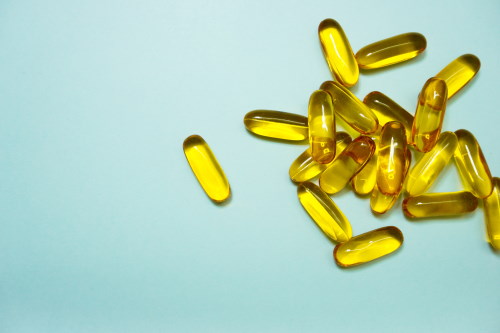Interest in marine oils like fish and krill has surged in the last decade as these oils are high in omega-3 fatty acids, which boast a wide range of benefits. When it comes to choosing which omega-3 supplement is best for you, it often comes down to krill oil vs. fish oil. Are they equivalent, or does one have the edge over the other?
It’s time to dive into the ocean of research on fish and krill oil.
BREAKING: Eat This - Never Forget A Single Thing Again
What is Fish Oil?
Fish oil is one of the most popular dietary supplements worldwide. This omega-3 fatty acid supplement is typically made from fatty fish, such as anchovies, mackerel, tuna, herring, and salmon. And it’s a healthy source of eicosapentaenoic acid (EPA) and docosahexaenoic acid (DHA), which have been shown to support heart and brain health.
What is Krill Oil?
Krill are small shrimp-like crustaceans that are abundant in our oceans. The word krill is Norwegian, and it means “small fish.” While they’re a favorite food for whales, seals, and penguins, they also benefit humans.
Like fish oils, krill oil is a rich source of the omega-3 fats docosahexaenoic acid (DHA) and eicosapentaenoic acid (EPA). Again, both of these essential fatty acids have been shown in research to support heart health, brain health, nervous system health, and healthy levels of inflammation. 1
Krill Oil Benefits
Krill oil has been shown to have a wide range of health benefits for the entire body. For instance, krill oil may support:
• Heart Health by reducing triglyceride levels and lowering total cholesterol levels. It may also boost HDL (the good cholesterol) levels. What’s more, krill oil may help decrease blood pressure, at least for some individuals. 2
In addition, krill oil was shown to be more effective than fish oil at lowering total and LDL cholesterol and triglyceride levels as well as blood sugar levels, even when lower amounts were consumed. 3
• The Body’s Ability to Fight off Free Radicals due to its rich supply of the carotenoid antioxidant known as astaxanthin. (This compound gives krill as well as shrimp and salmon their tell-tale pinkish-red coloring.) It’s been shown to be especially powerful at fighting the negative effects of free radicals in the brain, nervous system, and skin to help promote healthy aging. 4
• Healthy Joints as krill oil has been shown in studies to reduce joint pain and help support healthy levels of inflammation. One study, for example, found that participants taking 300 mg of krill per day for 30 days enjoyed a decrease in joint pain, which allowed them to cut back on medication. 5 Another study found that people with mild knee pain who used krill oil for 30 days experienced less pain when standing and sleeping. 6
• Decreased PMS Symptoms for those who experience pain and other uncomfortable issues during that time of the month, such as heightened emotions and dysmenorrhea. One study directly compared fish and krill oils and found both were helpful, but krill oil was significantly more effective. 7
• Brain Health due to its beneficial antioxidative effects and its potential to support healthy inflammation. The results are preliminary as they were performed with animals, but in this research, krill oil was found to help prevent cognitive impairment such as memory loss. 8
Other research performed with roundworms found that krill oil helped protect neurons from age-related declines in cognition. 9 In addition, krill oil is high in choline, which is a precursor to acetylcholine, a neurotransmitter that’s vital for several neurological functions, including:
- Memory
- Mood
- And muscle control 10
• Healthy Aging—krill oil may be beneficial for increasing longevity and locomotion. A recent study investigated how krill oil may support healthy aging. While again the research was done on roundworms, the study found krill oil could increase the lifespan of worms by four days. Keep in mind, the average lifespan of roundworms is only 18 to 20 days, but the aging process of these worms is similar to that of humans. This is why these worms are a useful model when studying longevity. And a 4-day increase is a 20+% increase in lifespan. 11, 12
Krill Oil vs. Fish Oil
Both krill and fish oil are healthy sources of DHA and EPA, which have numerous benefits for immune function, cardiovascular function, and neuroprotection and have been linked to healthy aging. 13 The two oils do have key differences, though. For instance, fish oil is typically yellow in color, whereas krill oils are a salmon pink to red color.
Krill oil also appears to have greater bioavailability in the body. That is, the body can absorb more of the essential fats from krill than from fish. 14 It also appears to have higher concentrations of free EPA and DHA. 15
Researchers suggest this may be because the DHA and EPA found in krill oil is in the form of molecules known as phospholipids. Fish oil, on the other hand, delivers the DHA and EPA as triglycerides. However, this is inconclusive, and more research is needed to determine why krill oil appears to be more easily absorbed.
Other research has found that krill oil is more effective at increasing levels of EPA and DHA in the brain, whereas fish oil is not. 16
Side Effects of Krill Oil vs. Fish Oil?
Fortunately, whether you decide to use fish oil or krill oil, side effects are typically uncommon and mild. Some that have been reported, though, include:
- An unpleasant, fishy taste in your mouth
- Bad breath
- A change in the smell of your sweat
- Diarrhea
- Heartburn
- Upset stomach
- Headaches
If you have bleeding issues or are on a blood-thinning medication (e.g., Coumadin), please speak with your doctor before using any omega-3 supplements as fish and krill oil are known to thin the blood. The same goes for folks going in for surgery, especially if they’re using high amounts of omega-3 supplements (between 3 and 6 grams per day). If possible, you will want to discontinue use weeks in advance due to potential complications from thinner blood. At the very least, let your doctor know what supplements you use before scheduling any surgery.
Finally, if you are allergic to seafood, then krill oil probably isn’t right for you. There’s also not enough research on the effects of krill oil on pregnancy, so it’s not recommended for pregnant or breastfeeding mothers.
Krill Oil vs. Fish Oil: A Wrap-Up
TRENDING: Viagra Obsolete: New Invention Cheaper, Safer, Faster
There’s no doubt about the health benefits of getting more omega-3 fatty acids in your diet. You can find foods high in these fats, such as cold-water fish like mackerel, salmon, herring, oysters, sardines, anchovies, caviar, and trout. Or, you can get these fats from flaxseed, chia seeds, walnuts, and soybeans.
Yet one of the easiest ways to ensure you are getting enough of these important essential fatty acids is by using a quality supplement. Fish oils tend to be more easily accessible and affordable, but krill oil does appear to have additional benefits. Of course, that doesn’t mean it will treat any condition (which no food or supplement can do). And more research is needed, especially in humans rather than animals. That said, krill oil does appear to help support healthy aging in many ways.









